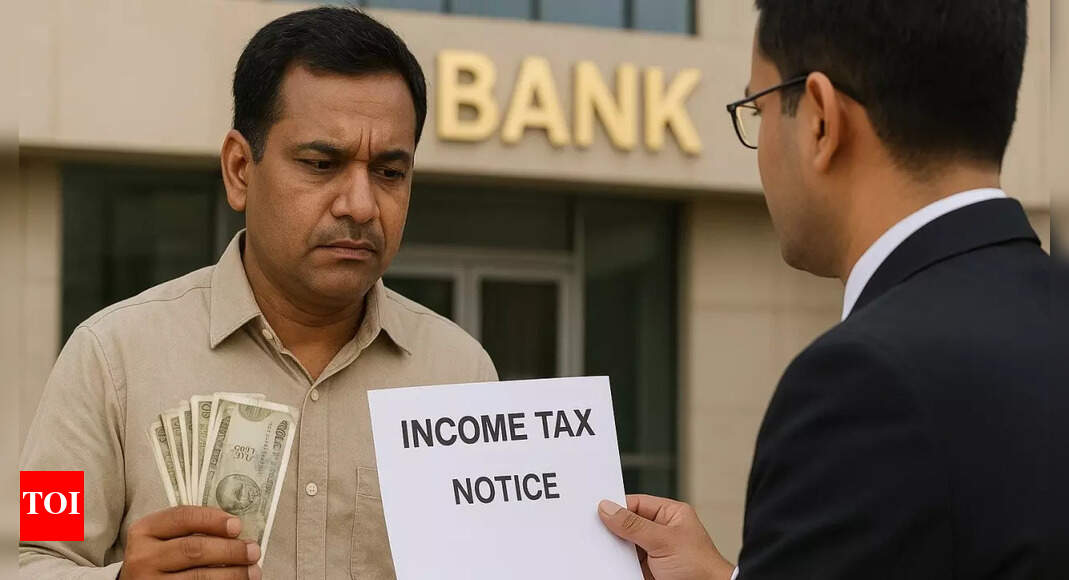
Making cash deposits of large amounts in your bank account? Be aware of a case where a cash deposit attracted the attention of the Income Tax Department, and the assessing officer deemed it as presumptive business income. When Mr. Kumar deposited Rs 8.68 lakh in his bank account, he didn’t expect a full-blown tax battle. What began as a simple query over a cash deposit soon snowballed into an intense legal fight — one that went all the way up to the Income Tax Appellate Tribunal (ITAT), Delhi. But Mr Kumar won the case, and here’s what the entire matter was about:Initially, the income tax department treated his case as a “limited scrutiny” — a focused assessment meant only to verify the source of the cash deposit. But during the process, the Assessing Officer (AO) decided to take things further. He added the amount to Kumar’s income as “presumptive business income” under Section 44AD of the Income-tax Act, effectively treating it as business profits.Also Read | Income Tax department doubts Rs 10 lakh gift – brother gets tax notice for cash received from sisters; how he appealed & won the caseKumar appealed before the Commissioner of Income Tax (Appeals), or CIT(A), but lost. Refusing to give up, he approached the ITAT Delhi — and on September 22, 2025, he finally won.
Cash deposits: Why ITAT ruled in favour of the depositor who got tax notice
According to an ET report quoting Dr. Suresh Surana, Chartered Accountant and founder of RSM India, the case (ITA No. 4778/Del/2025) involved scrutiny for the Assessment Year 2017–18, limited only to examining cash deposits.But during the assessment, the AO estimated Kumar’s business income under Section 44AD — something completely outside the scope of the original notice. Under CBDT’s (Central Board of Direct Taxes) own rules, any expansion of such a limited case into a full one requires prior approval from a Principal Commissioner.Surana explains, “The AO’s jurisdiction was confined strictly to verifying the source of cash deposits. Any inquiry beyond that needed formal approval to convert the case into a complete scrutiny.”After reviewing submissions from both sides, the ITAT Delhi found that the Assessing Officer and the CIT(A) had indeed gone beyond their powers. The Tribunal cited CBDT Instruction No. 5/2016 and subsequent communications that explicitly warn officers not to widen the scope of limited scrutiny cases.Also Read | Landlord vs tenant eviction case: Supreme Court rules in favour of landlord despite tenant’s son not signing rent receipts – here’s what the ruling meansThe ITAT also relied on a key Calcutta High Court decision — PCIT vs. Weilburger Coatings India (P) Ltd (2023) 155 Taxmann.com 580 (Cal) — which had already established that tax officers cannot expand the scope of scrutiny without higher approval.Quoting from the ruling, the ITAT observed that “both the AO and the Commissioner (Appeals) exceeded their jurisdiction by making and sustaining additions unrelated to the limited scrutiny issue.”The CBDT’s vigilance division had earlier, in November 2017, issued a stern reminder to officers after finding several cases where limited scrutiny was wrongly expanded. It even suspended one officer for failing to record reasons or seek approval before widening a case.This context weighed heavily in the Tribunal’s mind, the ET report said. The ITAT reiterated that these rules exist to ensure transparency, fairness, and accountability in the assessment process.Also Read | TDS error: Father gets income tax notice after selling ancestral land jointly with son – how he won the case in Income Tax Appellate Tribunal
What the ITAT ruling means for taxpayers
Experts say the ITAT Delhi ruling will serve as a benchmark. The ITAT’s ruling has wide implications for taxpayers facing “limited scrutiny” assessments — a mechanism designed to keep investigations narrow and efficient. It ensures that officers don’t overstep their jurisdiction or subject small taxpayers to unnecessary harassment.In Kumar’s case, the Tribunal ruled that the tax officer had exceeded his powers by turning a limited scrutiny into a full assessment without required approvals.This decision reinforces the boundaries of power within the income tax system. Limited scrutiny cases are meant to reduce taxpayer burden and ensure faster resolutions.








